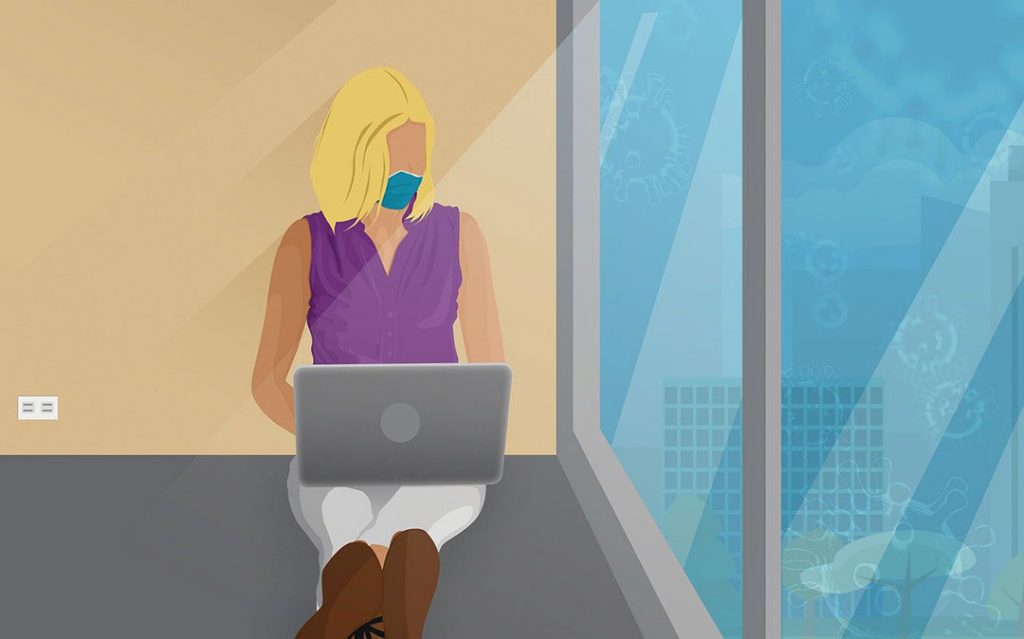How does journalism and integrated marketing communication education change in the midst of a pandemic? Here’s a look at how our faculty and students took on the challenge.

Coronavirus reporter illustrration
Anna Grace Usery, an instructor of journalism and integrated marketing communications who is the editor-in-chief of HottyToddy.com, said the Hotty Toddy News interns and her IMC 390 Advanced Writing students found new and innovative ways to tell community stories during this time.
“I’ve got students focusing on how local pastors are strengthening their faith by connecting with congregants who they can’t even see,” she said. “One intern is writing a really positive story about the abundance of fresh, local vegetables we’re going to have this summer and how to support farmers.

Anna Grace Usery
Usery said she thinks it’s fascinating that, in conjunction with students, teachers are discovering new ways to facilitate deep human connections.
“I’ve always taught that phone calls and email interviews should be last resort situations because we know that face-to-face interactions are the lifeblood of community journalism,” she said, “but those new media aspects are integral to storytellers during the quarantine. How do we make those deep connections that embody face-to-face interactions?
“You humanize those stories. You empathize. You give truthful representations of what people are feeling and facing. It’s so exciting to hear interns come back after they’ve researched, written and edited to say they’ve found deeper context to an issue because they found passionate people behind it. Then they become passionate about it. It’s a cycle you hope to inspire in young storytellers.”
Students in Interim Dean Debora Wenger’s J480 Advanced Video Newsgathering class held Google Meet news conferences with newsmakers, including the local school superintendent, the head of University Communications, and the head of communications for UM Athletics.
“They’ve been using FaceTime and other tools to get the people side of the story, i.e. the parent now homeschooling, the student wondering about refunds, and the spring athlete mourning their lost season,” Wenger said. “They also just recently wrapped up an assignment using an animation tool that allows you to easily illustrate concepts, like how to wear a mask properly or whether wearing gloves is a good idea. They’ve been doing amazing work – figuring out new tech and tools and, for the most part, cheerfully getting it all done.”
Graduate students in Wenger’s J610 Multimedia II class had been working on a semester-long project related to hunger in Mississippi when the campus closed.
“Much of their reporting was already done, so they are updating their stories in light of COVID-19, using an audio streaming service to interview their original sources,” Wenger said, “and then we’ll embed these episodes into the Feeding Mississippi website we’re creating. They have been a good team — working with and supporting each other.”
Wenger said one thing that’s essential in any career is adaptability.
“Boy, are they learning that right now,” she said. “They’re also learning that the storytelling principles we talk about are the foundation no matter what format or software you use. I’ve seen wonderful stories produced with an iPhone app, some designed solely for social media and others created for a TV news show – yet they all communicate the essential information people need to understand the story. Kudos to all of them!”

LaReeca Rucker
Professor LaReeca Rucker’s J102 Introduction to Multimedia Writing class reported on the pandemic and published their stories to the website OxfordStories.net.
“They have written about how some healthcare workers say more supplies are needed for them to do their jobs, how unemployment offices are struggling to address a record number of claims during the pandemic, and how panic buying has eliminated some necessary supplies in small towns like Eupora,” she said.
“They have written about how the Oxford Park Commission is working to improve its programming while it’s closed, how Mississippi hotel and Airbnb owners are feeling the effects of COVID-19, and how some are coping by volunteering during this time.”
“I hope that they realize they are doing important, meaningful work this time by providing information that connects their community and moves the conversation forward,” Rucker said. “I’m proud of the work they are doing. Keep reading Oxford Stories where they will be sharing more of their work.”
You can also find their work on social media. Look for Oxford Stories on Facebook, Instagram and Twitter @oxfordstories1.

Michael Fagans
Professor Michael Fagans teaches two sections of Jour 456 Capstone Journalism Innovation.
Some of his students worked on stories about student services being offered during the pandemic, how college seniors are presenting their thesis/final art portfolios online and staying sane while social distancing with your family.
They also covered topics about child abuse and neglect, businesses still operating, how workers at Parchman handled COVID-19 from prison, and how treatment and addiction centers were coping with the situation.
Some students explored how churches held services, what apartment complexes did for residents, the impact on study abroad students, guns as big sellers, and students also produced weekly vlogs.
Professor Cynthia Joyce said students from JOUR 377 Advanced Reporting continued to report from home and did a fantastic job.
Their work was published on HottyToddy, the Daily Mississippian and The Oxford Eagle websites. They wrote about subjects ranging from mental health access, grassroots aid for restaurant workers, rental issues, and the campus ministry adjusting to online fellowship.
Assistant Professor of Journalism Iveta Imre, Ph.D., said her students in a JOUR 378 Television Reporting class also covered local stories about the pandemic.
“They are interviewing sources via Zoom, getting creative with footage, and doing stand-ups all from their homes,” she said. “I have been really impressed with their effort and focus on the work. They have easily transitioned to online teaching, which, for this video class, was not an easy task at hand. I think they are getting valuable experience on reporting during trying times, and I could not be more proud.”
One social media video has been viewed more than 6,000 times.
Professor R.J. Morgan, who is also the director of the Mississippi Scholastic Press Association, said he’s seen countless teachers and students working overtime to cover the virus and its impact on local communities.
“It’s a major, major disruption of life for, well, for all of us,” he said, “but even amidst all the chaos, I’m still seeing students post meaningful, well-thought-out content in service of their audience.”
Morgan said high schools were out, but many teachers were still meeting regularly with their staffs via Zoom, etc., and editors were still making assignments and proofing pages.
“It has all been amazing to watch,” he said. “We had our annual MSPA spring awards ceremony on March 31, which we conducted digitally for the first time. In light of the ongoing crisis, we added four special COVID-19 categories to our carry-in contests, and we got some really incredible examples of student work that had been produced in such a short amount of time.”
Morgan said the student work demonstrates how seriously students take their jobs and how much their role as student reporters means to them.
“You don’t see that kind of commitment evolving from many other curricular activities,” he said. “We posted the winner/finalists’ works on our website if you’d like to see them.”
Tags: covid-19, pandemic, student journalists, student journalists during the pandeic



